Gallery
Image Type
Morphological Structure
Clades
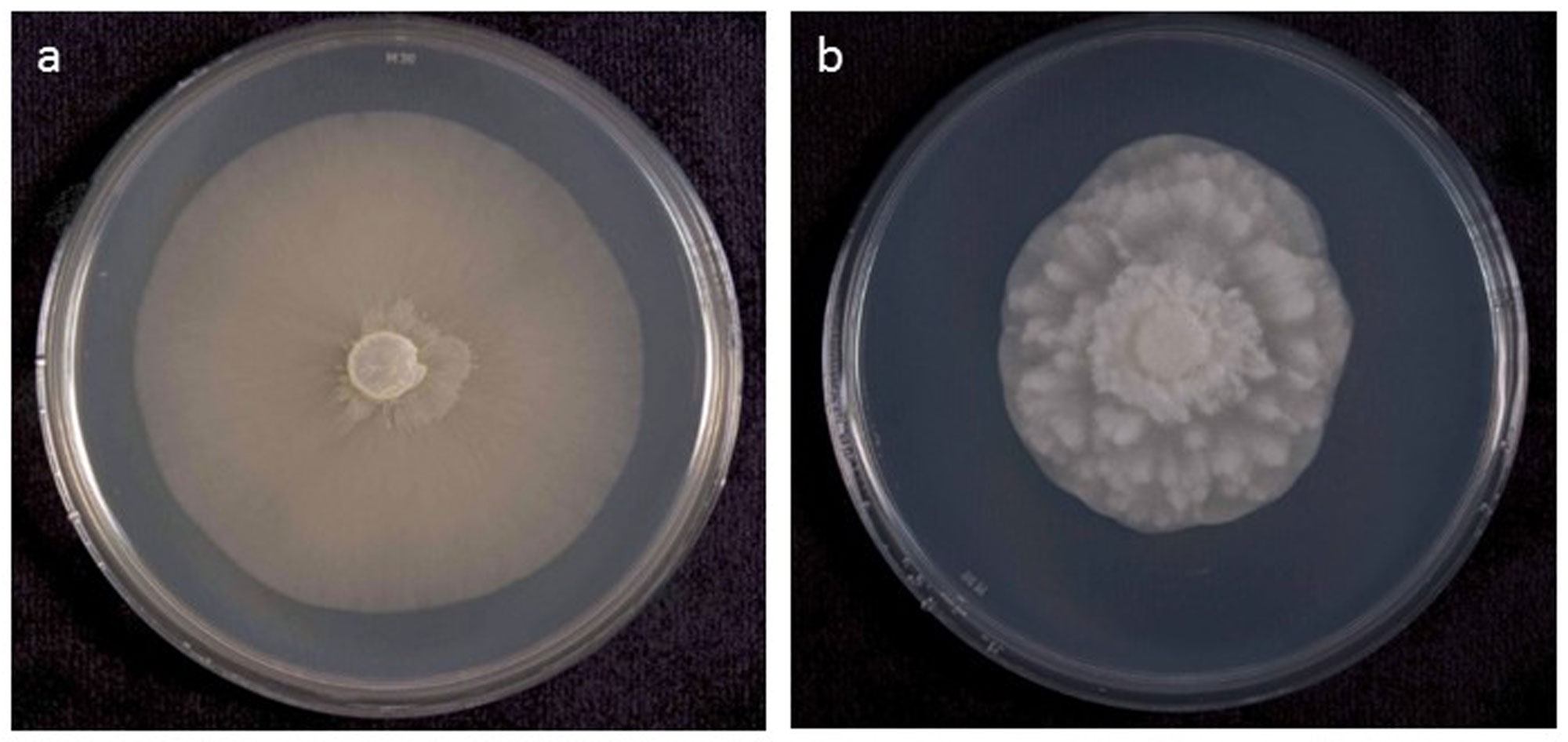 Phytophthora lateralis (P3888 WPC) colony of selected specimen grown for 7 days on (a) V8 agar and (b) potato dextrose agar; photos by Yilmaz Balci, USDA-APHIS-PPQ
Phytophthora lateralis (P3888 WPC) colony of selected specimen grown for 7 days on (a) V8 agar and (b) potato dextrose agar; photos by Yilmaz Balci, USDA-APHIS-PPQ
Phytophthora lateralis (P3888 WPC) colony of selected specimen grown for 7 days on (a) V8 agar and (b) potato dextrose agar; photos by Yilmaz Balci, USDA-APHIS-PPQ
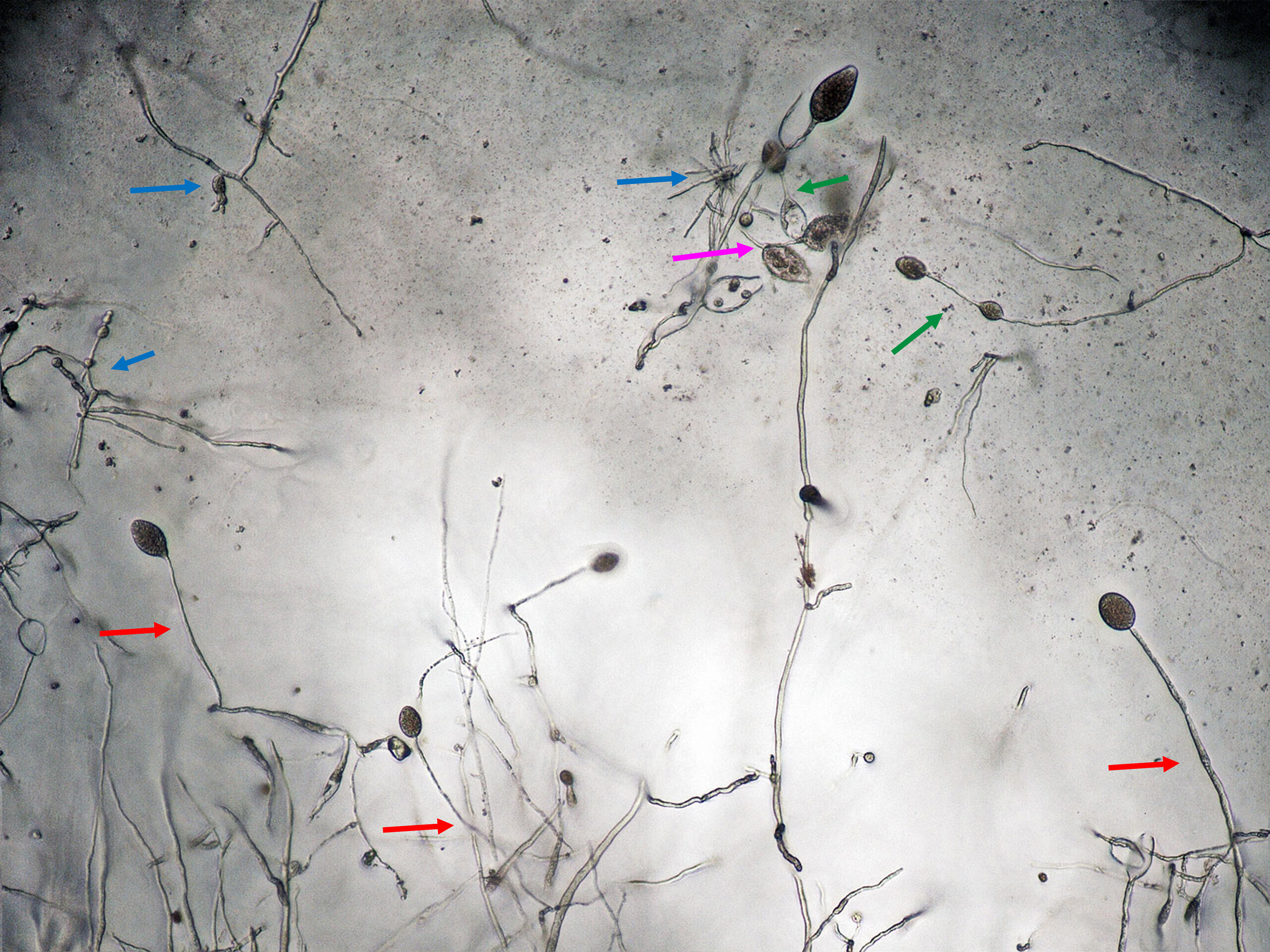 P. lateralis nbsp;asexual phase of selected specimen P3888 (WPC) showing sporangia produced in sporangiophores: individual long (red arrows), simple sympodial (purple arrow), external proliferation (green arrows); hyphal swellings (blue arrows); photo by Gloria Abad, USDA-APHIS-PPQ.
P. lateralis nbsp;asexual phase of selected specimen P3888 (WPC) showing sporangia produced in sporangiophores: individual long (red arrows), simple sympodial (purple arrow), external proliferation (green arrows); hyphal swellings (blue arrows); photo by Gloria Abad, USDA-APHIS-PPQ.
P. lateralis asexual phase of selected specimen P3888 (WPC) showing sporangia produced in sporangiophores: individual long (red arrows), simple sympodial (purple arrow), external proliferation (green arrows); hyphal swellings (blue arrows); photo by Gloria Abad, USDA-APHIS-PPQ.
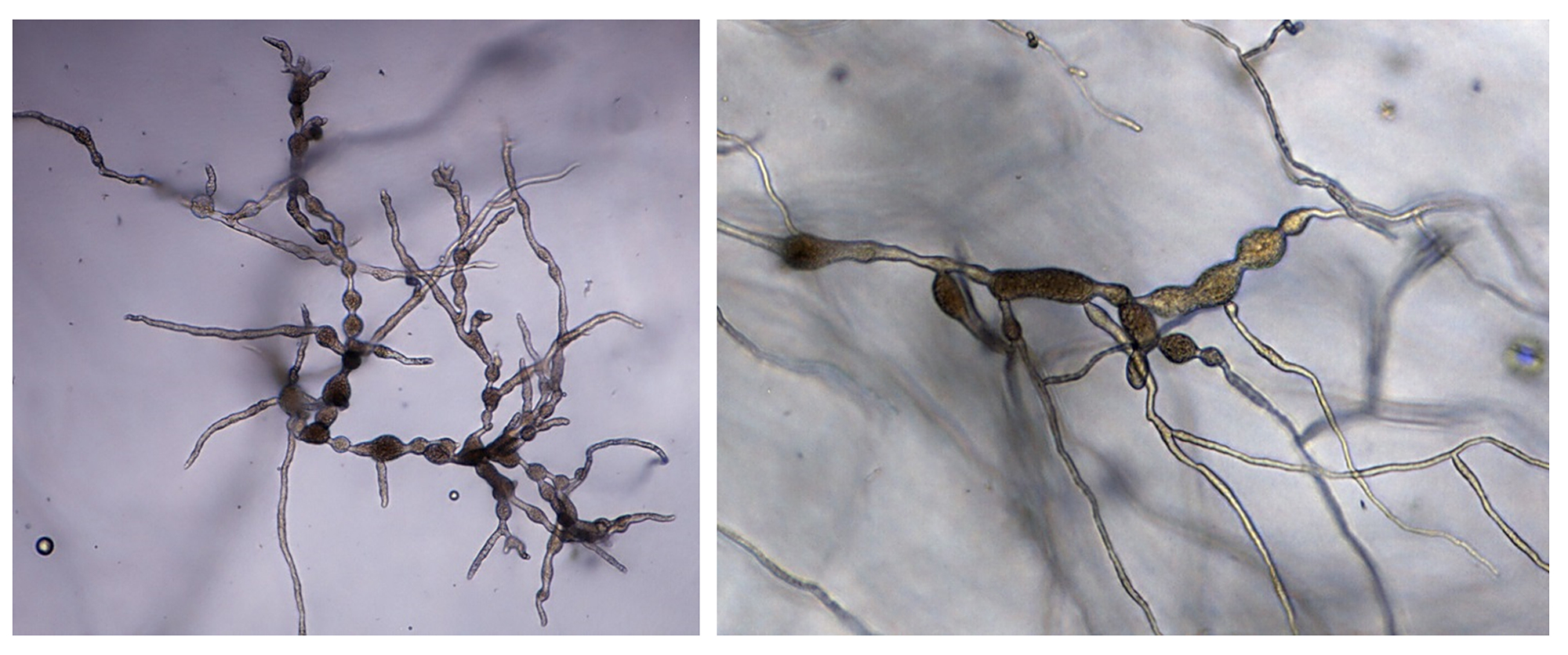 Phytophthora lateralis nbsp;lobate and irregular hyphal swellings produced by selected specimen P3888 (WPC) in hemp seed agar media; photos by Gloria Abad, USDA-APHIS-PPQ.
Phytophthora lateralis nbsp;lobate and irregular hyphal swellings produced by selected specimen P3888 (WPC) in hemp seed agar media; photos by Gloria Abad, USDA-APHIS-PPQ.
Phytophthora lateralis lobate and irregular hyphal swellings produced by selected specimen P3888 (WPC) in hemp seed agar media; photos by Gloria Abad, USDA-APHIS-PPQ.
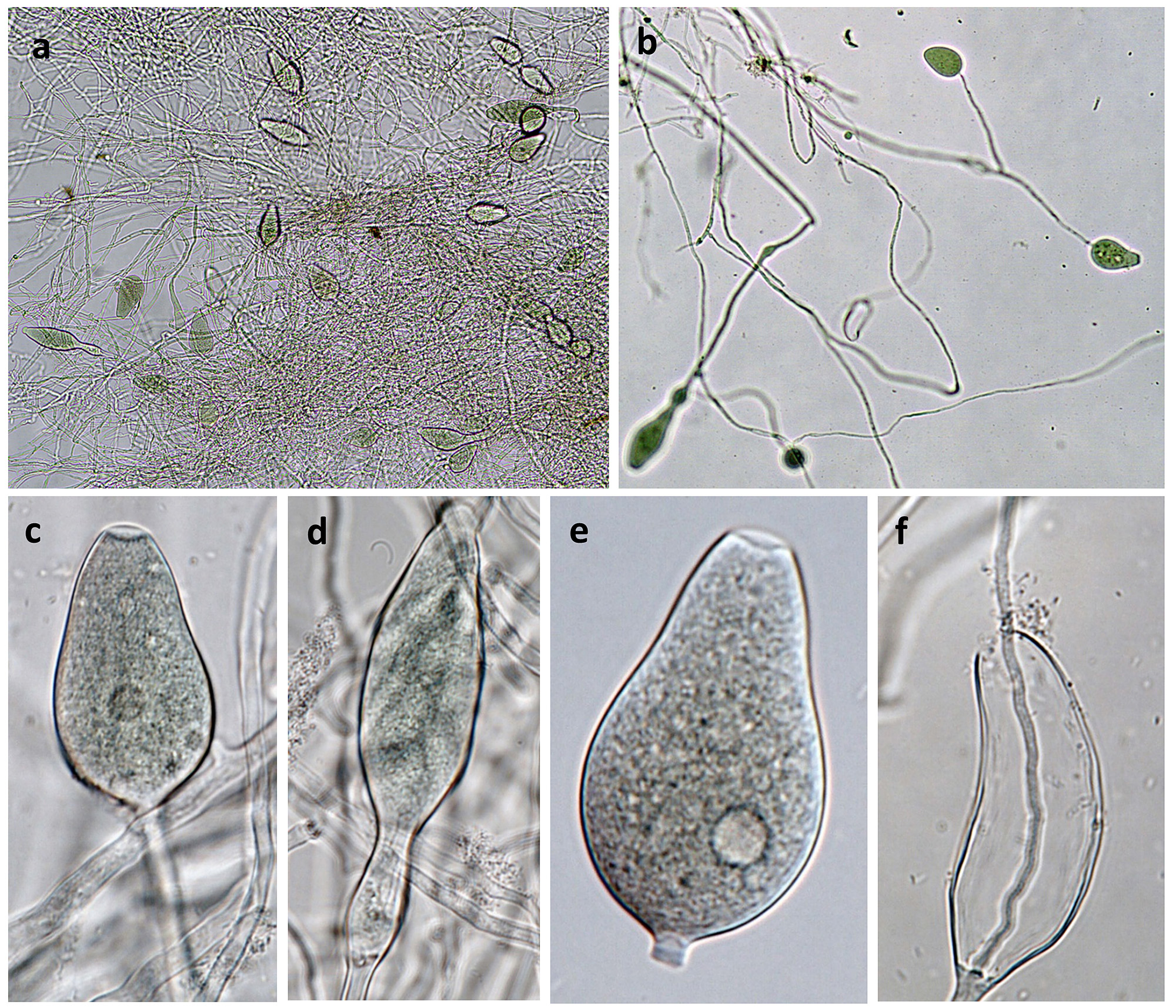 Phytophthora lateralis nbsp;selected specimen (P11090 WPC) asexual phase: (a, b) sporangia in sporangiophores; (c, d) persistent sporangia; (e) caducous sporangium with short pedicel; (f) sporangium with internal proliferation; photos by G. Abad, USDA-APHIS-PPQ.
Phytophthora lateralis nbsp;selected specimen (P11090 WPC) asexual phase: (a, b) sporangia in sporangiophores; (c, d) persistent sporangia; (e) caducous sporangium with short pedicel; (f) sporangium with internal proliferation; photos by G. Abad, USDA-APHIS-PPQ.
Phytophthora lateralis selected specimen (P11090 WPC) asexual phase: (a, b) sporangia in sporangiophores; (c, d) persistent sporangia; (e) caducous sporangium with short pedicel; (f) sporangium with internal proliferation; photos by G. Abad, USDA-APHIS-PPQ.
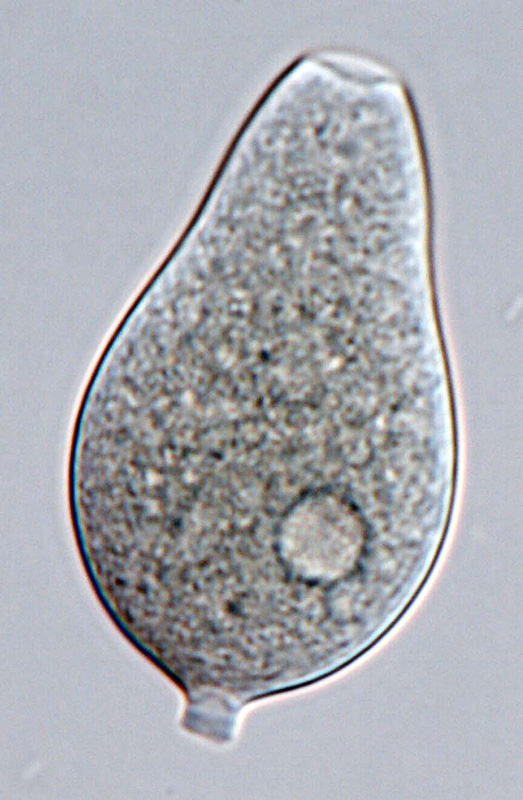 Phytophthora lateralis nbsp;selected specimen (P11090 WPC) asexual phase: caducous sporangium with short pedicel;nbsp;photonbsp;by G. Abad, USDA-APHIS-PPQ.
Phytophthora lateralis nbsp;selected specimen (P11090 WPC) asexual phase: caducous sporangium with short pedicel;nbsp;photonbsp;by G. Abad, USDA-APHIS-PPQ.
Phytophthora lateralis selected specimen (P11090 WPC) asexual phase: caducous sporangium with short pedicel; photo by G. Abad, USDA-APHIS-PPQ.
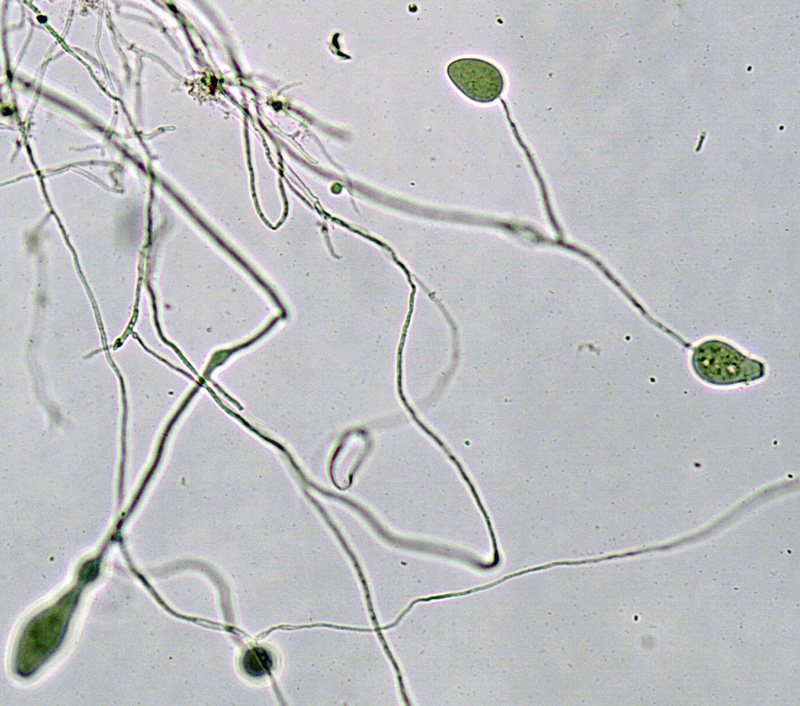 Phytophthora lateralis nbsp;selected specimen (P11090 WPC) asexual phase: sporangia in sporangiophores; photonbsp;by G. Abad, USDA-APHIS-PPQ.
Phytophthora lateralis nbsp;selected specimen (P11090 WPC) asexual phase: sporangia in sporangiophores; photonbsp;by G. Abad, USDA-APHIS-PPQ.
Phytophthora lateralis selected specimen (P11090 WPC) asexual phase: sporangia in sporangiophores; photo by G. Abad, USDA-APHIS-PPQ.
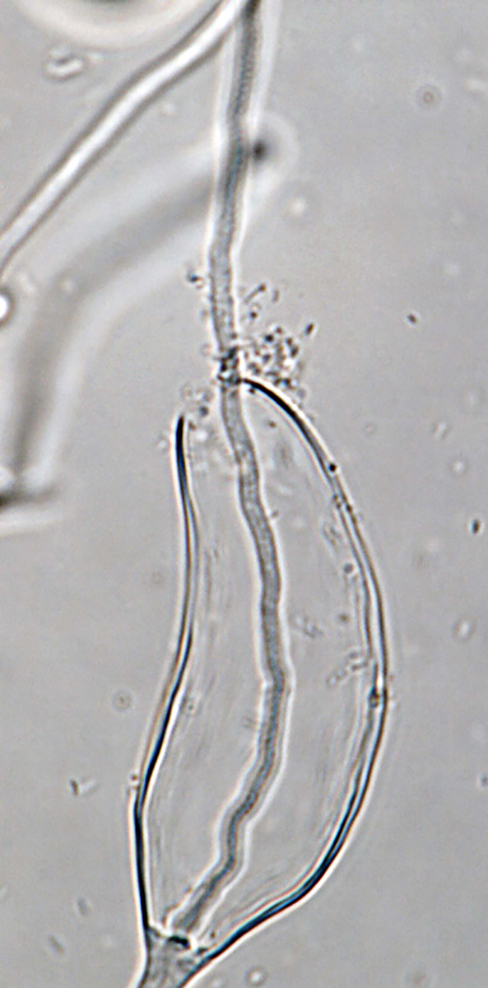 Phytophthora lateralis nbsp;selected specimen (P11090 WPC) asexual phase: sporangium with internal proliferation; photonbsp;by G. Abad, USDA-APHIS-PPQ.
Phytophthora lateralis nbsp;selected specimen (P11090 WPC) asexual phase: sporangium with internal proliferation; photonbsp;by G. Abad, USDA-APHIS-PPQ.
Phytophthora lateralis selected specimen (P11090 WPC) asexual phase: sporangium with internal proliferation; photo by G. Abad, USDA-APHIS-PPQ.
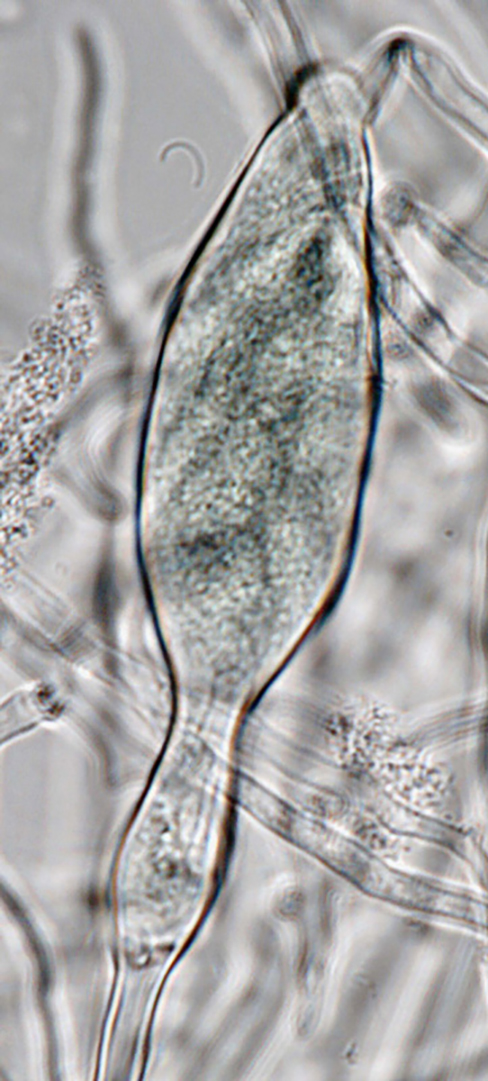 Phytophthora lateralis nbsp;selected specimen (P11090 WPC) asexual phase: persistent sporangium; photonbsp;by G. Abad, USDA-APHIS-PPQ.
Phytophthora lateralis nbsp;selected specimen (P11090 WPC) asexual phase: persistent sporangium; photonbsp;by G. Abad, USDA-APHIS-PPQ.
Phytophthora lateralis selected specimen (P11090 WPC) asexual phase: persistent sporangium; photo by G. Abad, USDA-APHIS-PPQ.
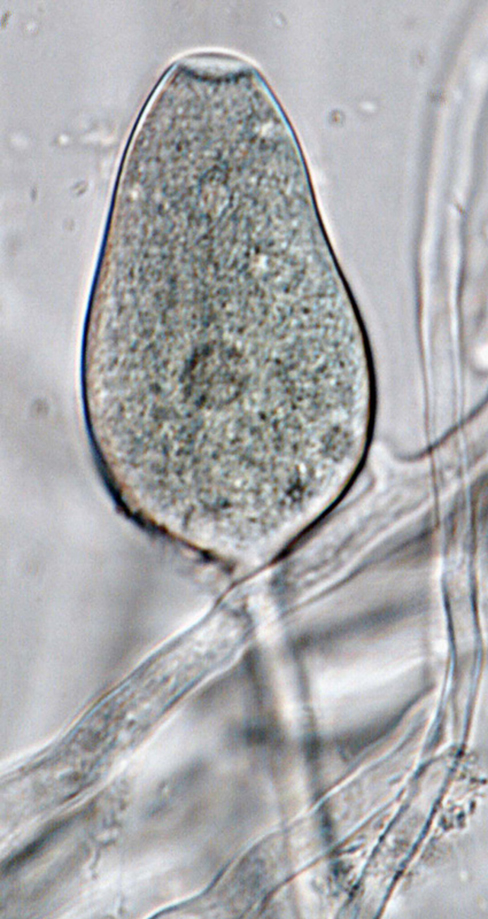 Phytophthora lateralis nbsp;selected specimen (P11090 WPC) asexual phase: persistent sporangium; photonbsp;by G. Abad, USDA-APHIS-PPQ.
Phytophthora lateralis nbsp;selected specimen (P11090 WPC) asexual phase: persistent sporangium; photonbsp;by G. Abad, USDA-APHIS-PPQ.
Phytophthora lateralis selected specimen (P11090 WPC) asexual phase: persistent sporangium; photo by G. Abad, USDA-APHIS-PPQ.
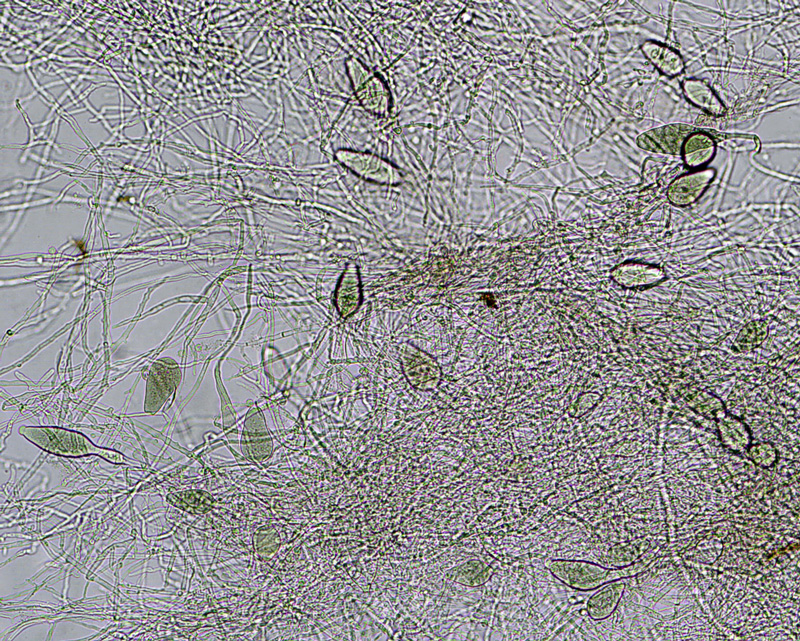 Phytophthora lateralis nbsp;selected specimen (P11090 WPC) asexual phase:nbsp;sporangia in sporangiophores; photonbsp;by G. Abad, USDA-APHIS-PPQ.
Phytophthora lateralis nbsp;selected specimen (P11090 WPC) asexual phase:nbsp;sporangia in sporangiophores; photonbsp;by G. Abad, USDA-APHIS-PPQ.
Phytophthora lateralis selected specimen (P11090 WPC) asexual phase: sporangia in sporangiophores; photo by G. Abad, USDA-APHIS-PPQ.
Phytophthora spp. in Clade 11: portion of the seven-loci ML phylogeny featuring the type cultures of 212 described species (by T. Bourret). Notice the position of P. lilii Ex-type CBS 135746 = S&T BL 123. Gloria Abad, USDA S&T.
Phytophthora spp. in Clade 11: Morphological Tabular key (PDF) and Tabular key legends (PDF) in IDphy2 KEY SECTION. Notice the data of P. lilii Ex-type CBS 135746 = S&T BL 123. Gloria Abad, USDA S&T.
 Phytophthora lilli (CPHST BL 123) colonies of the ex-type grown for 7 days on (a) V8reg; Agar, (b) potato dextrose agar, and (c) malt extract agar; photo by Krysta Jennings and Leandra Knight, USDA-APHIS-PPQ
Phytophthora lilli (CPHST BL 123) colonies of the ex-type grown for 7 days on (a) V8reg; Agar, (b) potato dextrose agar, and (c) malt extract agar; photo by Krysta Jennings and Leandra Knight, USDA-APHIS-PPQ
Phytophthora lilli (CPHST BL 123) colonies of the ex-type grown for 7 days on (a) V8® Agar, (b) potato dextrose agar, and (c) malt extract agar; photo by Krysta Jennings and Leandra Knight, USDA-APHIS-PPQ
Phytophthora lilii (ex-type EL-8701 = CBS 135746) colony morphology and temperature requirements; slide provided by Koji Kageyama and Mohammad Z. Rahman Gifu University, Japan
Phytophthora lilii (ex-type CBS 135746) asexual phase: (a–d) sporangia nonpapillate persistent, (b) external proliferation, (c, d) internal proliferation, (e) globose and irregular hyphal swellings, (f) globose chlamydospores; photos by Koji Kageyama and Mohammad Z. Rahman Gifu University, Japan.
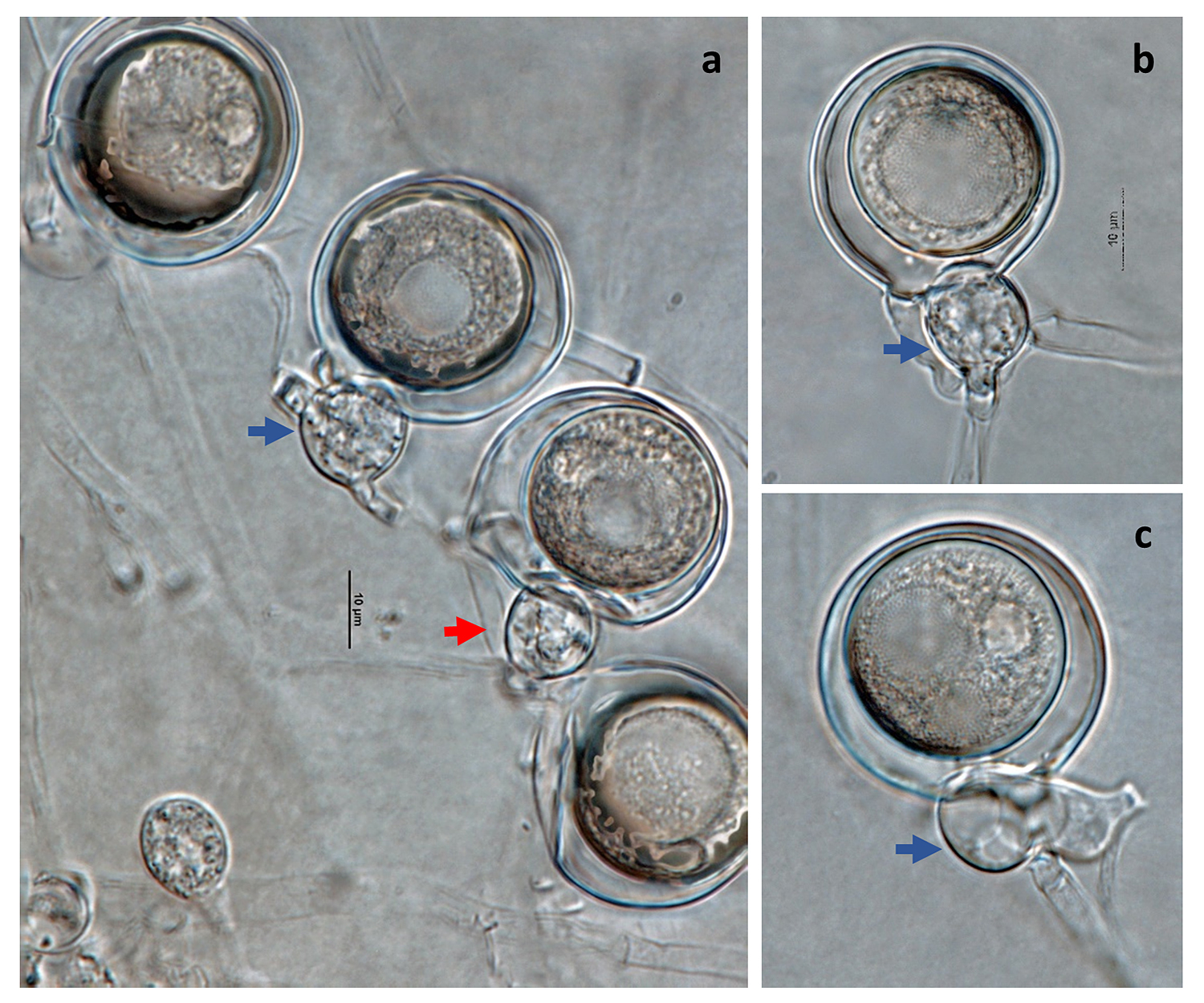 Phytophthora lilii nbsp;(ex-type CPHST BL 123 = CBS 135746) sexual phase: (andash;c) smooth-walled oogonia with aplerotic oospores, (blue arrows) paragynous antheridia, (red arrow) amphigynous antheridia rarely produced; photos by Gloria Abad, USDA-APHIS-PPQ.
Phytophthora lilii nbsp;(ex-type CPHST BL 123 = CBS 135746) sexual phase: (andash;c) smooth-walled oogonia with aplerotic oospores, (blue arrows) paragynous antheridia, (red arrow) amphigynous antheridia rarely produced; photos by Gloria Abad, USDA-APHIS-PPQ.
Phytophthora lilii (ex-type CPHST BL 123 = CBS 135746) sexual phase: (a–c) smooth-walled oogonia with aplerotic oospores, (blue arrows) paragynous antheridia, (red arrow) amphigynous antheridia rarely produced; photos by Gloria Abad, USDA-APHIS-PPQ.
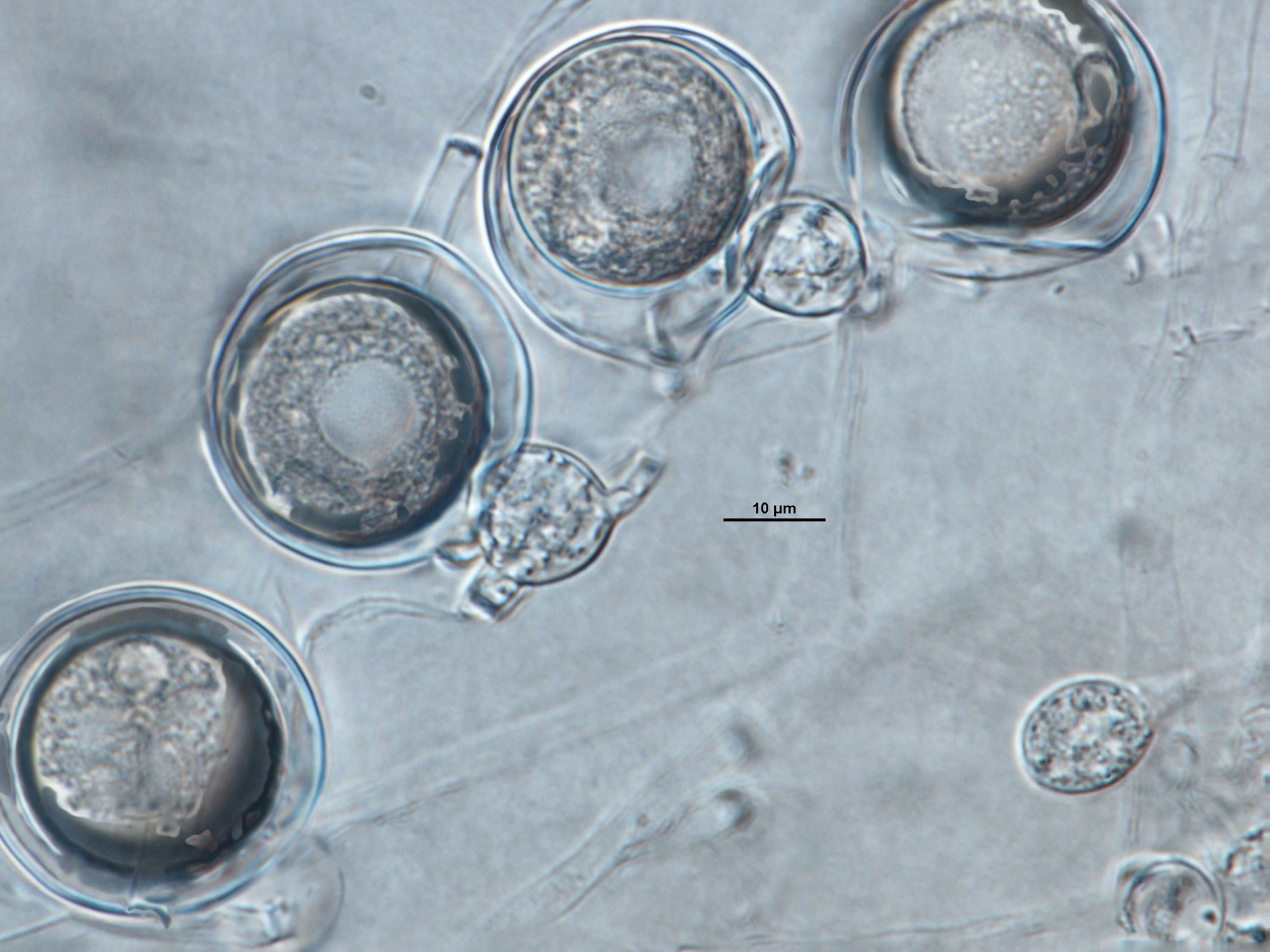 Phytophthora lilii nbsp;(ex-type CPHST BL 123 = CBS 135746) sexual phase:nbsp;smooth-walled oogonia with aplerotic oospores.Showing paragynous antheridiumnbsp;(middle left) andnbsp;amphigynous antheridium (middle right)nbsp;rarely produced;nbsp;photonbsp;by Gloria Abad, USDA-APHIS-PPQ.
Phytophthora lilii nbsp;(ex-type CPHST BL 123 = CBS 135746) sexual phase:nbsp;smooth-walled oogonia with aplerotic oospores.Showing paragynous antheridiumnbsp;(middle left) andnbsp;amphigynous antheridium (middle right)nbsp;rarely produced;nbsp;photonbsp;by Gloria Abad, USDA-APHIS-PPQ.
Phytophthora lilii (ex-type CPHST BL 123 = CBS 135746) sexual phase: smooth-walled oogonia with aplerotic oospores.Showing paragynous antheridium (middle left) and amphigynous antheridium (middle right) rarely produced; photo by Gloria Abad, USDA-APHIS-PPQ.
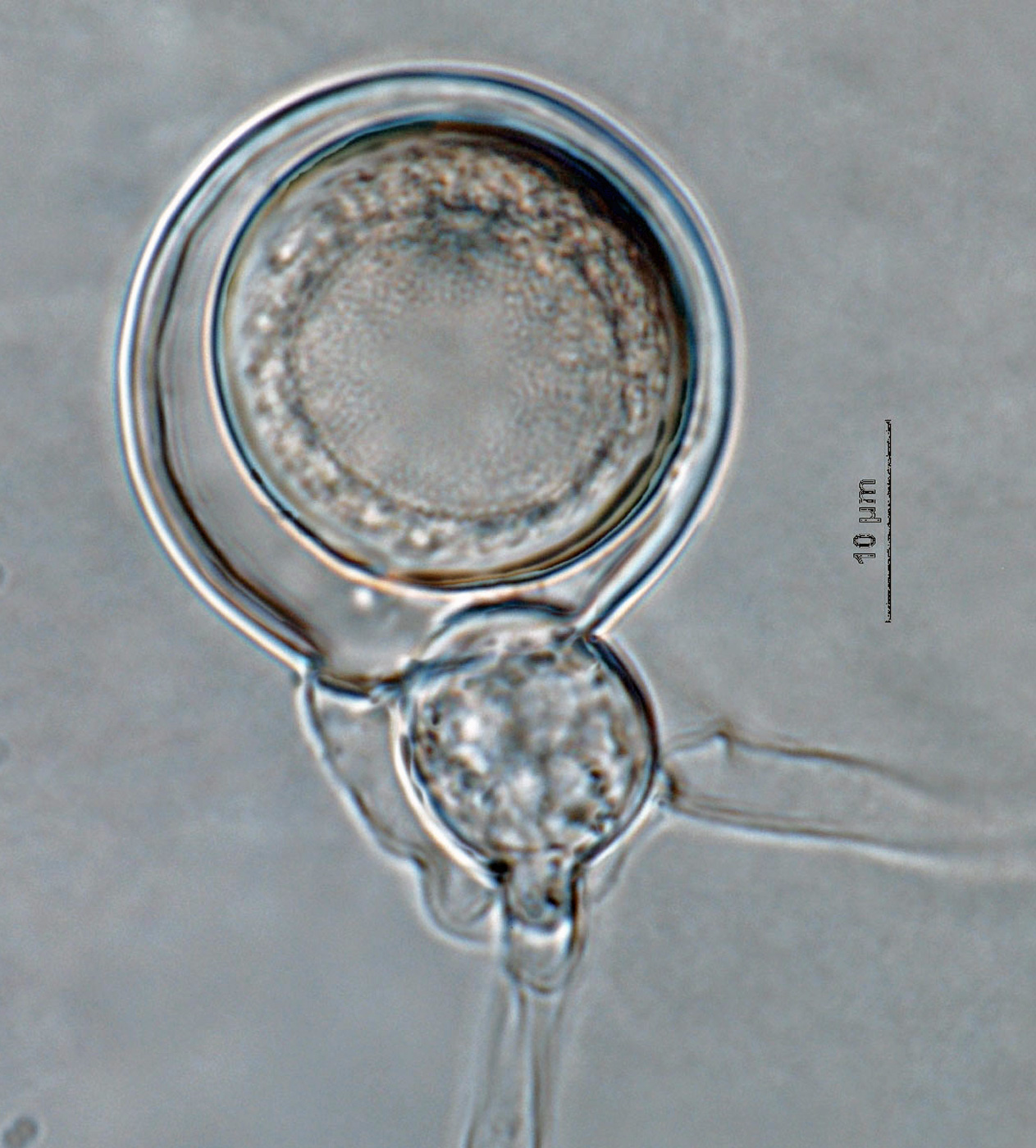 Phytophthora lilii nbsp;(ex-type CPHST BL 123 = CBS 135746) sexual phase:nbsp;smooth-walled oogonia with aplerotic oospore with paragynous antheridium; photonbsp;by Gloria Abad, USDA-APHIS-PPQ.
Phytophthora lilii nbsp;(ex-type CPHST BL 123 = CBS 135746) sexual phase:nbsp;smooth-walled oogonia with aplerotic oospore with paragynous antheridium; photonbsp;by Gloria Abad, USDA-APHIS-PPQ.
Phytophthora lilii (ex-type CPHST BL 123 = CBS 135746) sexual phase: smooth-walled oogonia with aplerotic oospore with paragynous antheridium; photo by Gloria Abad, USDA-APHIS-PPQ.
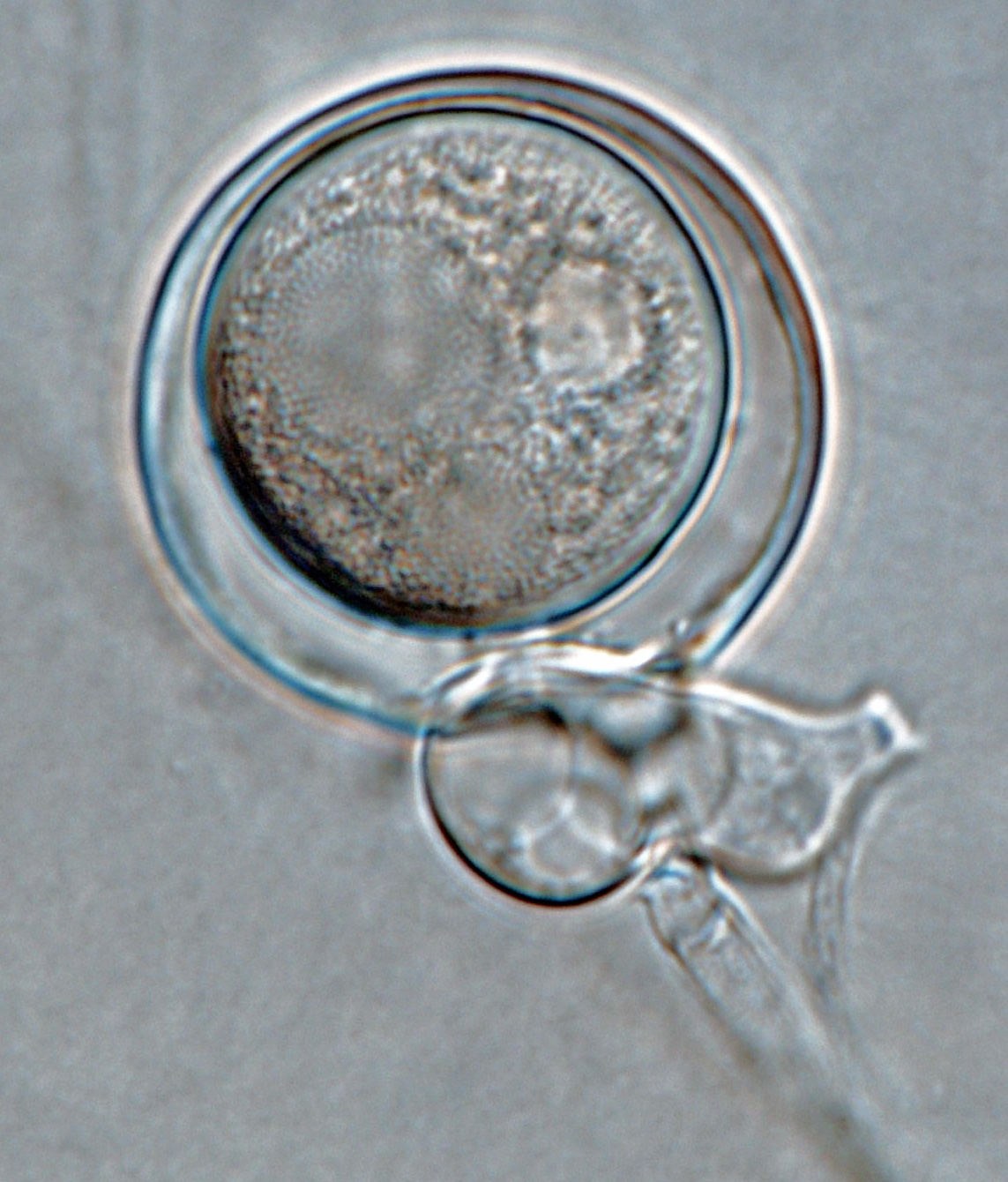 Phytophthora lilii nbsp;(ex-type CPHST BL 123 = CBS 135746) sexual phase:nbsp;smooth-walled oogonia with aplerotic oospore withnbsp;paragynous antheridium;nbsp;photonbsp;by Gloria Abad, USDA-APHIS-PPQ.
Phytophthora lilii nbsp;(ex-type CPHST BL 123 = CBS 135746) sexual phase:nbsp;smooth-walled oogonia with aplerotic oospore withnbsp;paragynous antheridium;nbsp;photonbsp;by Gloria Abad, USDA-APHIS-PPQ.
Phytophthora lilii (ex-type CPHST BL 123 = CBS 135746) sexual phase: smooth-walled oogonia with aplerotic oospore with paragynous antheridium; photo by Gloria Abad, USDA-APHIS-PPQ.
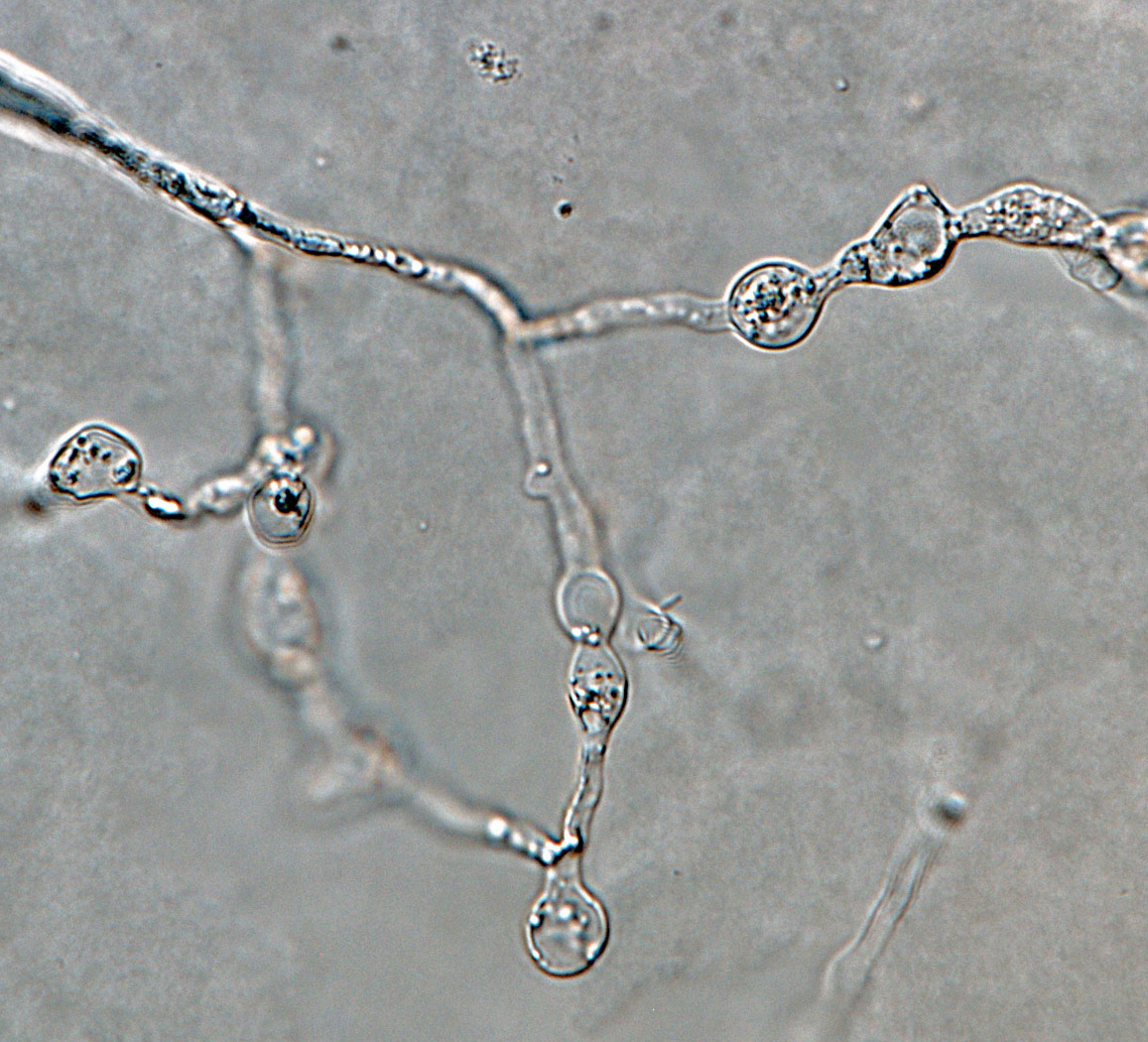 Phytophthora lilii nbsp;(ex-type CBS 135746) asexual phase:nbsp;globose and irregular hyphal swellings; photonbsp;by Koji Kageyama and Mohammad Z. Rahman Gifu University, Japan.
Phytophthora lilii nbsp;(ex-type CBS 135746) asexual phase:nbsp;globose and irregular hyphal swellings; photonbsp;by Koji Kageyama and Mohammad Z. Rahman Gifu University, Japan.
Phytophthora lilii (ex-type CBS 135746) asexual phase: globose and irregular hyphal swellings; photo by Koji Kageyama and Mohammad Z. Rahman Gifu University, Japan.
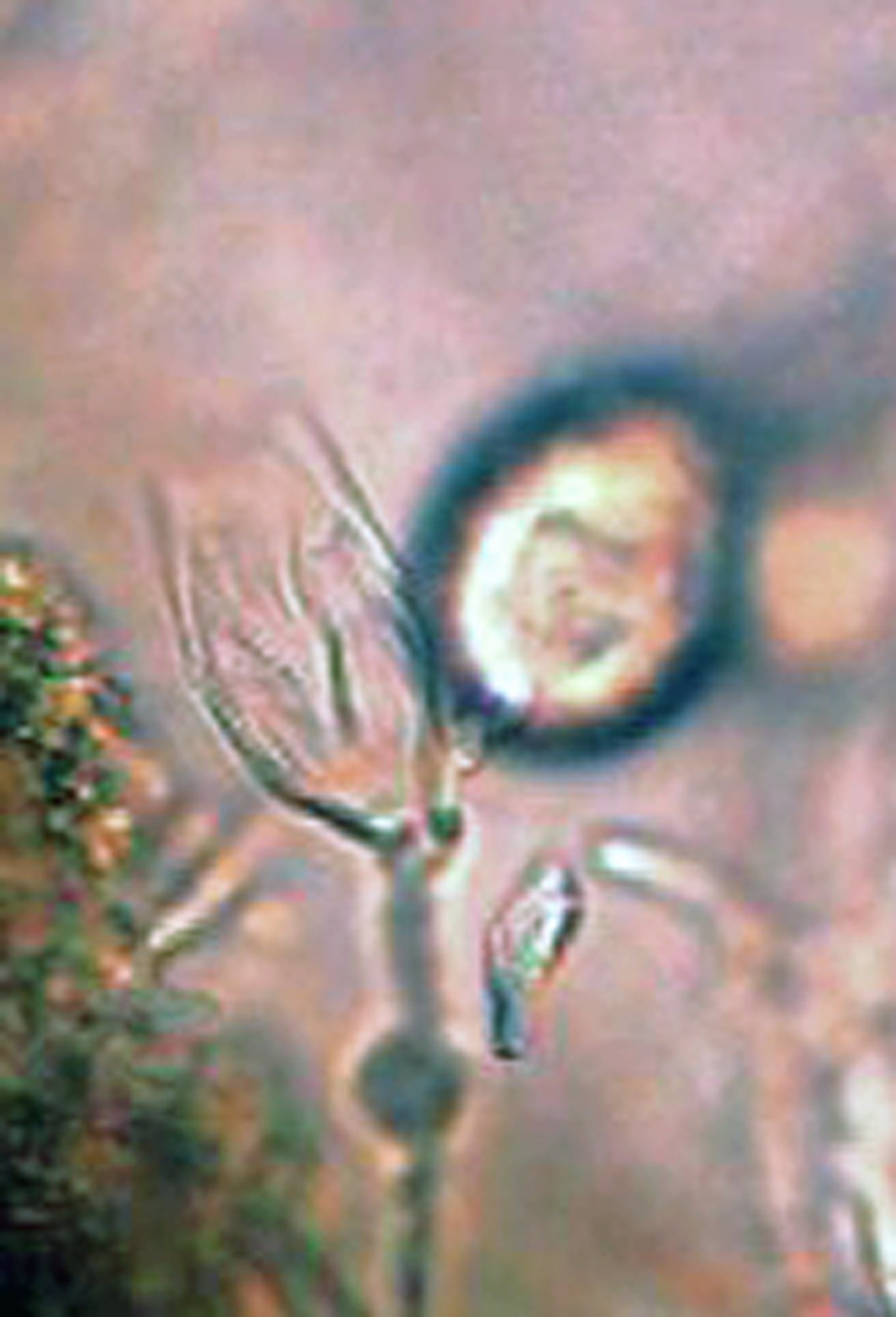 Phytophthora lilii nbsp;(ex-type CBS 135746) asexual phase:nbsp;external proliferation ofnbsp;sporangium; photos by Koji Kageyama and Mohammad Z. Rahman Gifu University, Japan.
Phytophthora lilii nbsp;(ex-type CBS 135746) asexual phase:nbsp;external proliferation ofnbsp;sporangium; photos by Koji Kageyama and Mohammad Z. Rahman Gifu University, Japan.
Phytophthora lilii (ex-type CBS 135746) asexual phase: external proliferation of sporangium; photos by Koji Kageyama and Mohammad Z. Rahman Gifu University, Japan.
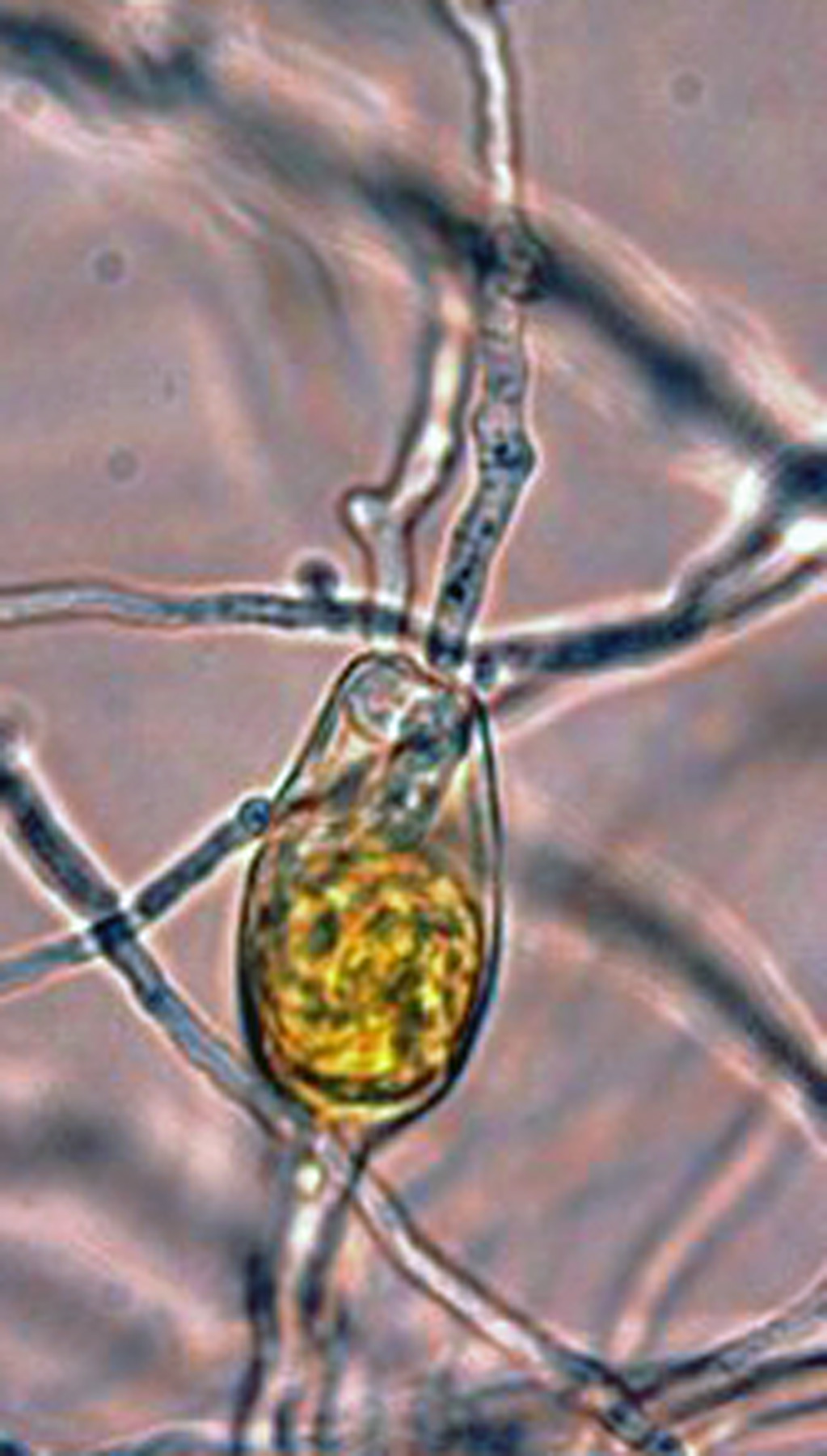 Phytophthora lilii nbsp;(ex-type CBS 135746) asexual phase:nbsp;internal proliferation ofnbsp;sporangium; photos by Koji Kageyama and Mohammad Z. Rahman Gifu University, Japan.
Phytophthora lilii nbsp;(ex-type CBS 135746) asexual phase:nbsp;internal proliferation ofnbsp;sporangium; photos by Koji Kageyama and Mohammad Z. Rahman Gifu University, Japan.
Phytophthora lilii (ex-type CBS 135746) asexual phase: internal proliferation of sporangium; photos by Koji Kageyama and Mohammad Z. Rahman Gifu University, Japan.
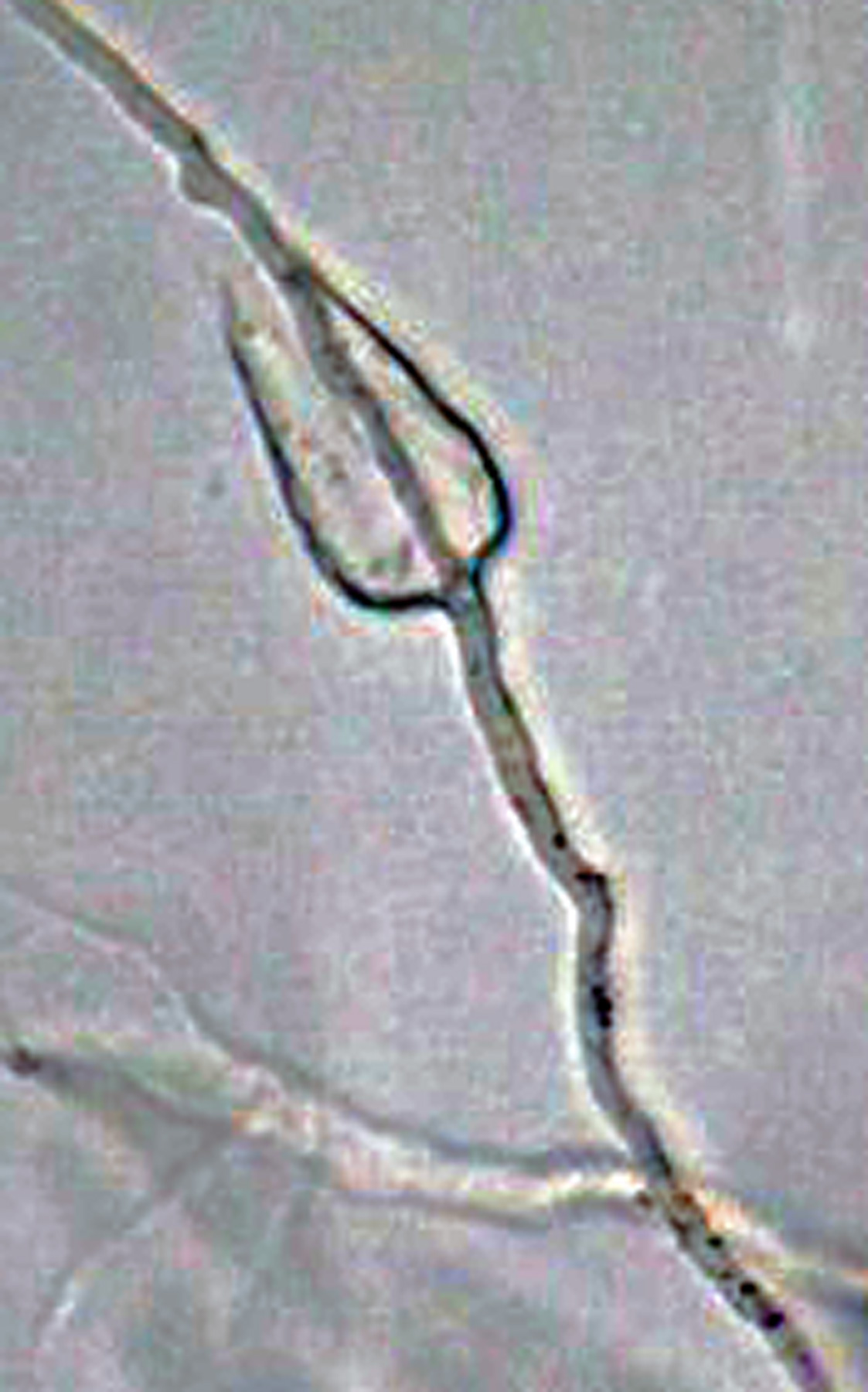 Phytophthora lilii nbsp;(ex-type CBS 135746) asexual phase:nbsp;internal proliferation ofnbsp;sporangium; photos by Koji Kageyama and Mohammad Z. Rahman Gifu University, Japan.
Phytophthora lilii nbsp;(ex-type CBS 135746) asexual phase:nbsp;internal proliferation ofnbsp;sporangium; photos by Koji Kageyama and Mohammad Z. Rahman Gifu University, Japan.
Phytophthora lilii (ex-type CBS 135746) asexual phase: internal proliferation of sporangium; photos by Koji Kageyama and Mohammad Z. Rahman Gifu University, Japan.
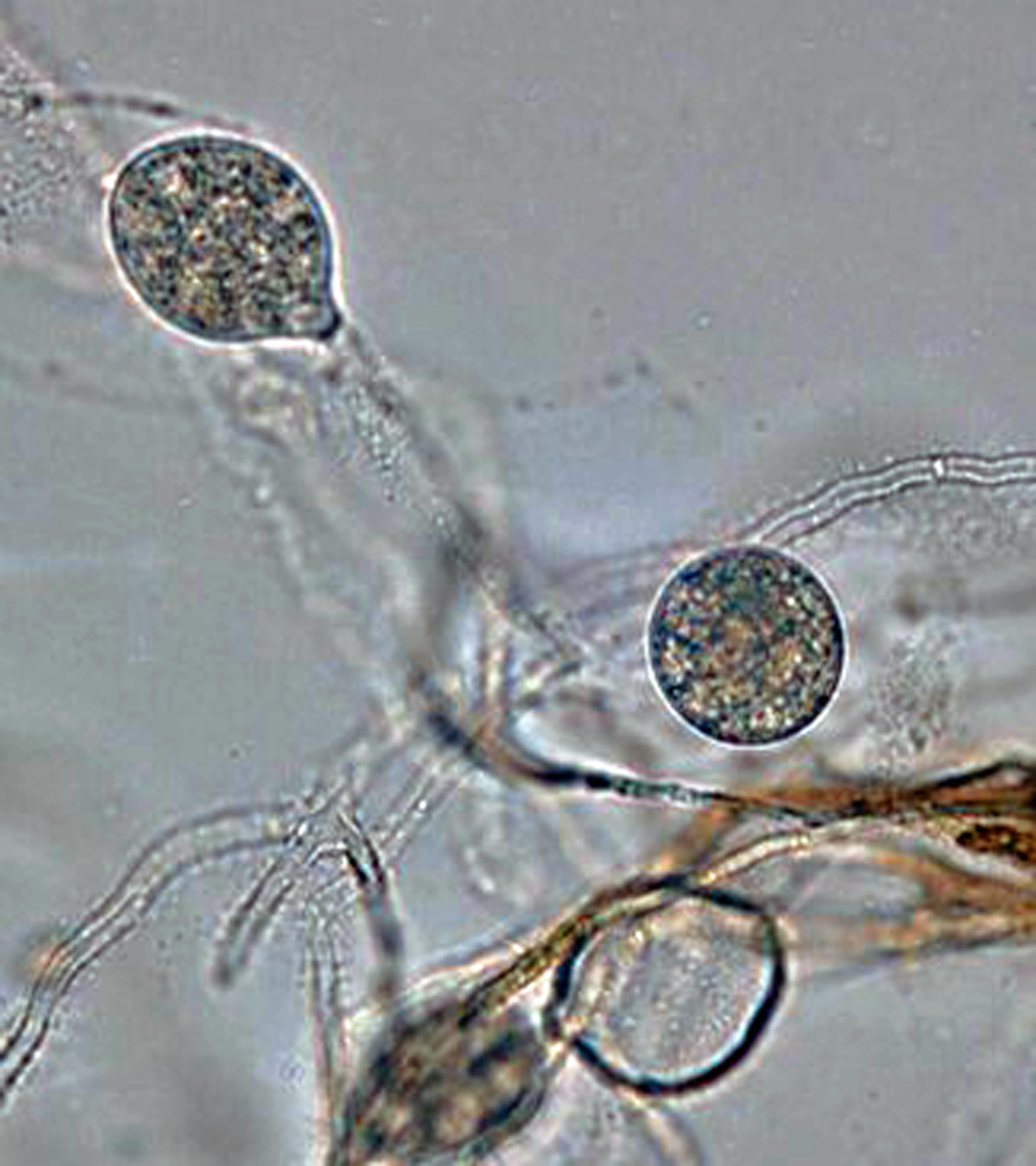 Phytophthora lilii nbsp;(ex-type CBS 135746) asexual phase:nbsp;globose chlamydospores; photonbsp;by Koji Kageyama and Mohammad Z. Rahman Gifu University, Japan.
Phytophthora lilii nbsp;(ex-type CBS 135746) asexual phase:nbsp;globose chlamydospores; photonbsp;by Koji Kageyama and Mohammad Z. Rahman Gifu University, Japan.
Phytophthora lilii (ex-type CBS 135746) asexual phase: globose chlamydospores; photo by Koji Kageyama and Mohammad Z. Rahman Gifu University, Japan.
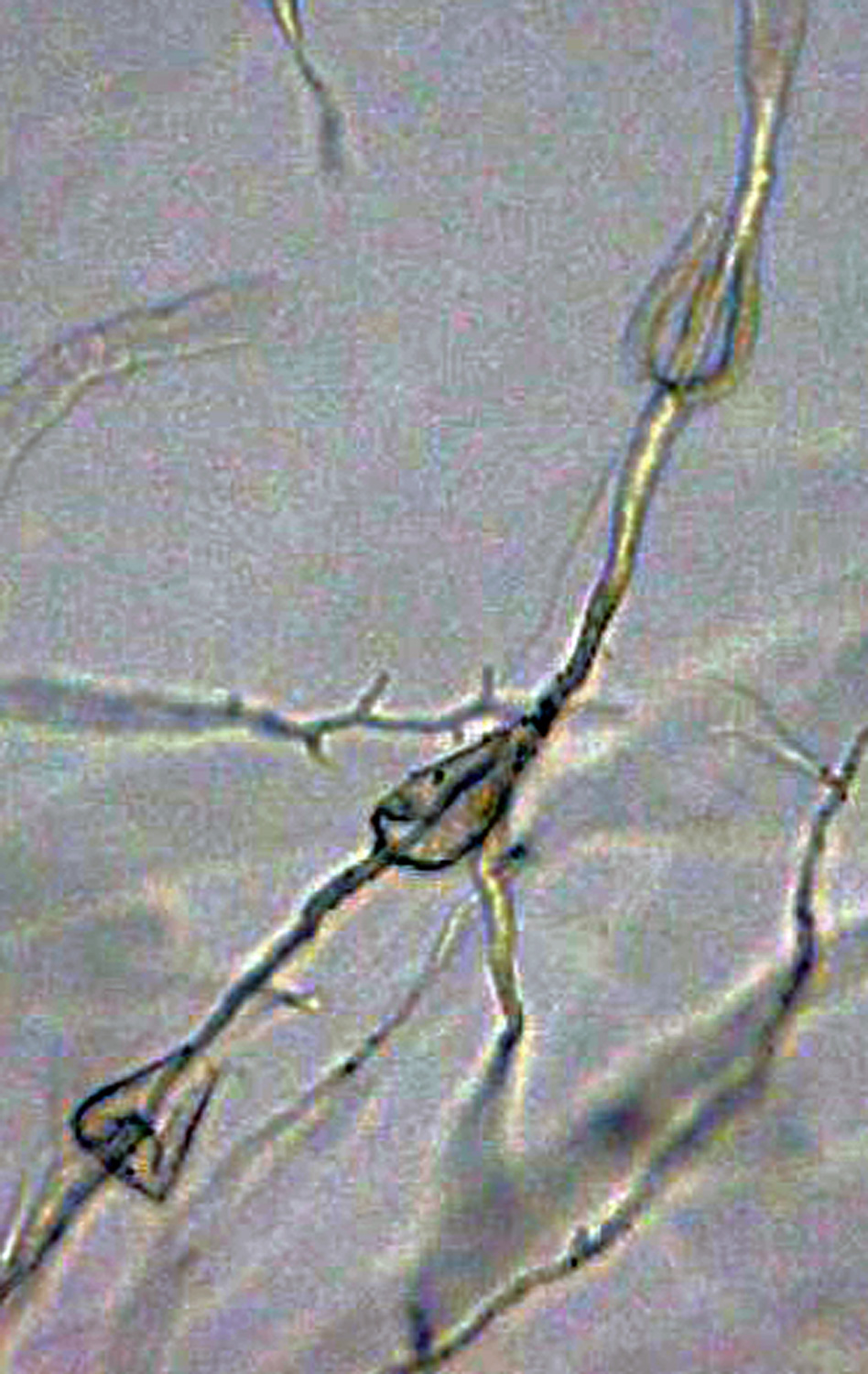 Phytophthora lilii nbsp;(ex-type CBS 135746) asexual phase:nbsp;internal proliferation ofnbsp;sporangia; photos by Koji Kageyama and Mohammad Z. Rahman Gifu University, Japan.
Phytophthora lilii nbsp;(ex-type CBS 135746) asexual phase:nbsp;internal proliferation ofnbsp;sporangia; photos by Koji Kageyama and Mohammad Z. Rahman Gifu University, Japan.
Phytophthora lilii (ex-type CBS 135746) asexual phase: internal proliferation of sporangia; photos by Koji Kageyama and Mohammad Z. Rahman Gifu University, Japan.
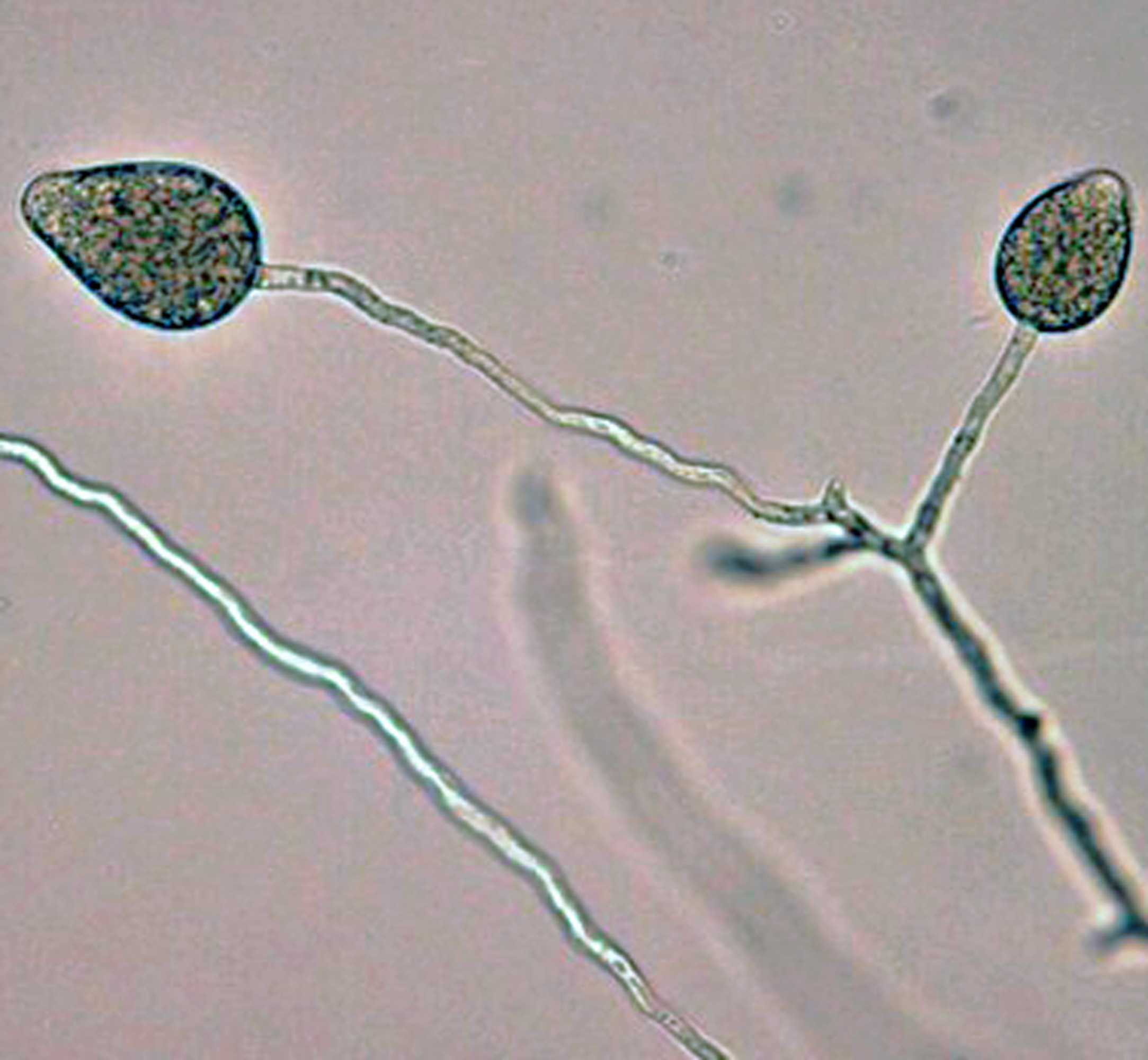 Phytophthora lilii nbsp;(ex-type CBS 135746) asexual phase:nbsp;nonpapillatenbsp;persistent sporangia; photos by Koji Kageyama and Mohammad Z. Rahman Gifu University, Japan.
Phytophthora lilii nbsp;(ex-type CBS 135746) asexual phase:nbsp;nonpapillatenbsp;persistent sporangia; photos by Koji Kageyama and Mohammad Z. Rahman Gifu University, Japan.
Phytophthora lilii (ex-type CBS 135746) asexual phase: nonpapillate persistent sporangia; photos by Koji Kageyama and Mohammad Z. Rahman Gifu University, Japan.
Phytophthora spp. in Clade 4: portion of the seven-loci ML phylogeny featuring the type cultures of 212 described species (by T. Bourret). Notice the position of P. litchii Ex-neotype CBS 100.81 = S&T BL 48G. Gloria Abad, USDA S&T.
Phytophthora spp. in Clade 4: Morphological Tabular key (PDF) and Tabular key legends (PDF) in IDphy2 KEY SECTION. Notice the data of P. litchii Ex-neotype CBS 100.81 = S&T BL 48G. Gloria Abad, USDA S&T.
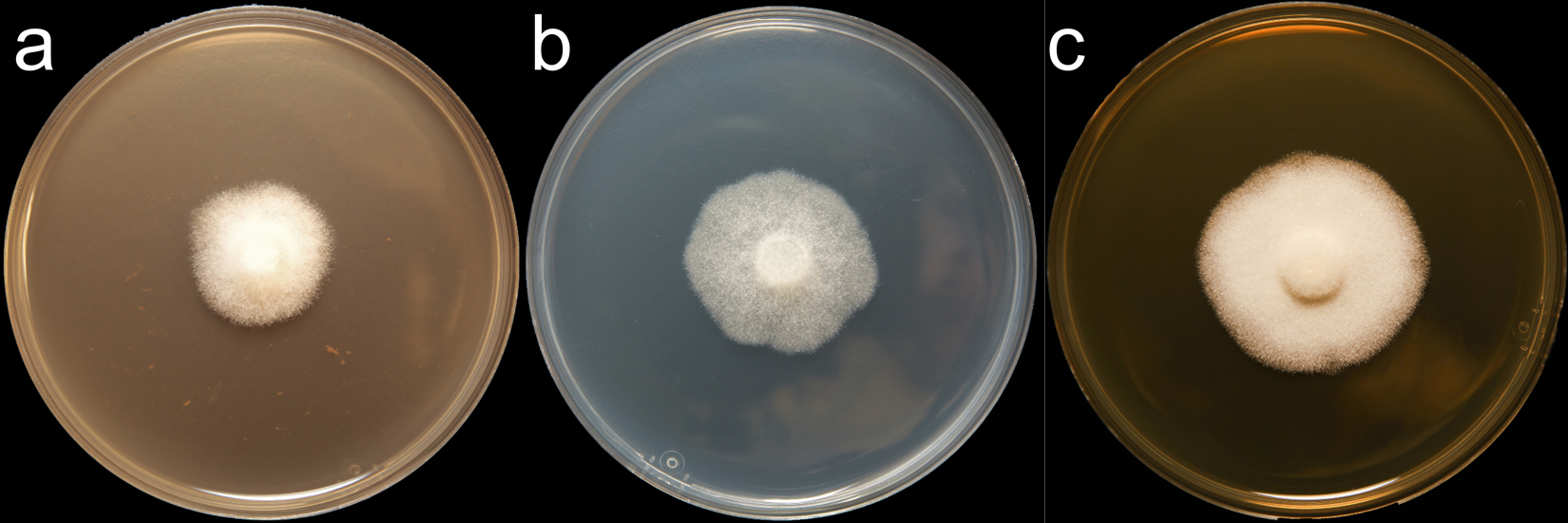 Phytophthora litchii (CPHST BL 48G) colonies of a selected specimen grown for 7 days on (a) V8reg; Agar, (b) potato dextrose agar, and (c) malt extract agar; photo by Krysta Jennings and Leandra Knight, USDA-APHIS-PPQ
Phytophthora litchii (CPHST BL 48G) colonies of a selected specimen grown for 7 days on (a) V8reg; Agar, (b) potato dextrose agar, and (c) malt extract agar; photo by Krysta Jennings and Leandra Knight, USDA-APHIS-PPQ
Phytophthora litchii (CPHST BL 48G) colonies of a selected specimen grown for 7 days on (a) V8® Agar, (b) potato dextrose agar, and (c) malt extract agar; photo by Krysta Jennings and Leandra Knight, USDA-APHIS-PPQ
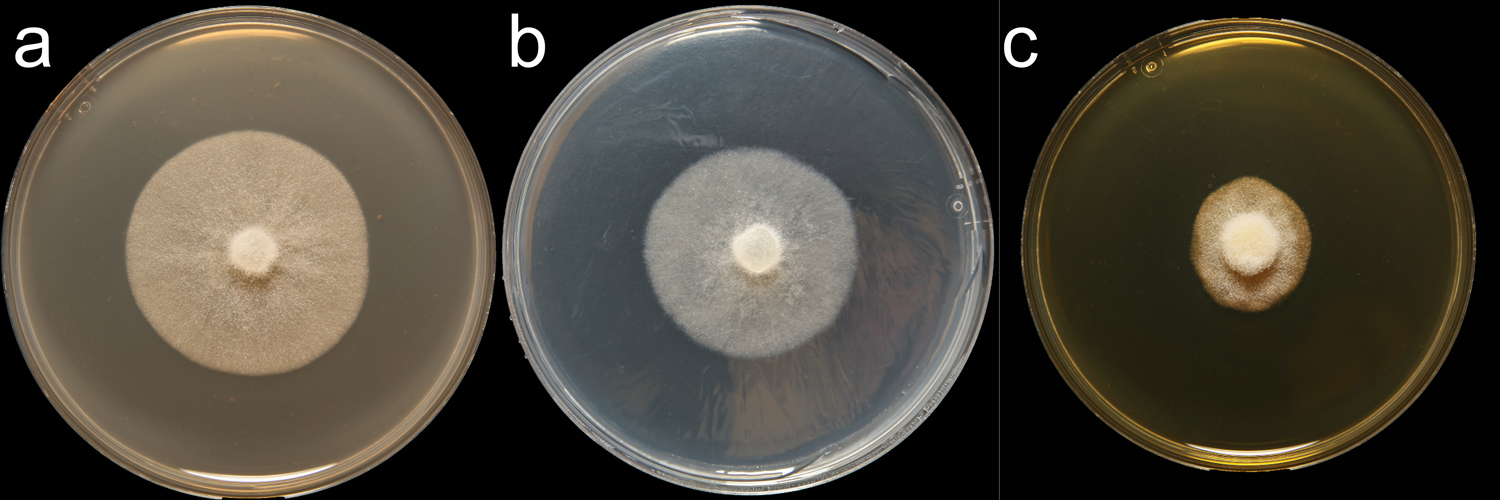 Phytophthora litchii (CPHST BL 145) colonies of a selected specimen grown for 7 days on (a) V8 Agar, (b) potato dextrose agar, and (c) malt extract agar; photo by Clinton Greub, Krysta Jennings and Leandra Knight, USDA-APHIS-PPQ
Phytophthora litchii (CPHST BL 145) colonies of a selected specimen grown for 7 days on (a) V8 Agar, (b) potato dextrose agar, and (c) malt extract agar; photo by Clinton Greub, Krysta Jennings and Leandra Knight, USDA-APHIS-PPQ
Phytophthora litchii (CPHST BL 145) colonies of a selected specimen grown for 7 days on (a) V8 Agar, (b) potato dextrose agar, and (c) malt extract agar; photo by Clinton Greub, Krysta Jennings and Leandra Knight, USDA-APHIS-PPQ
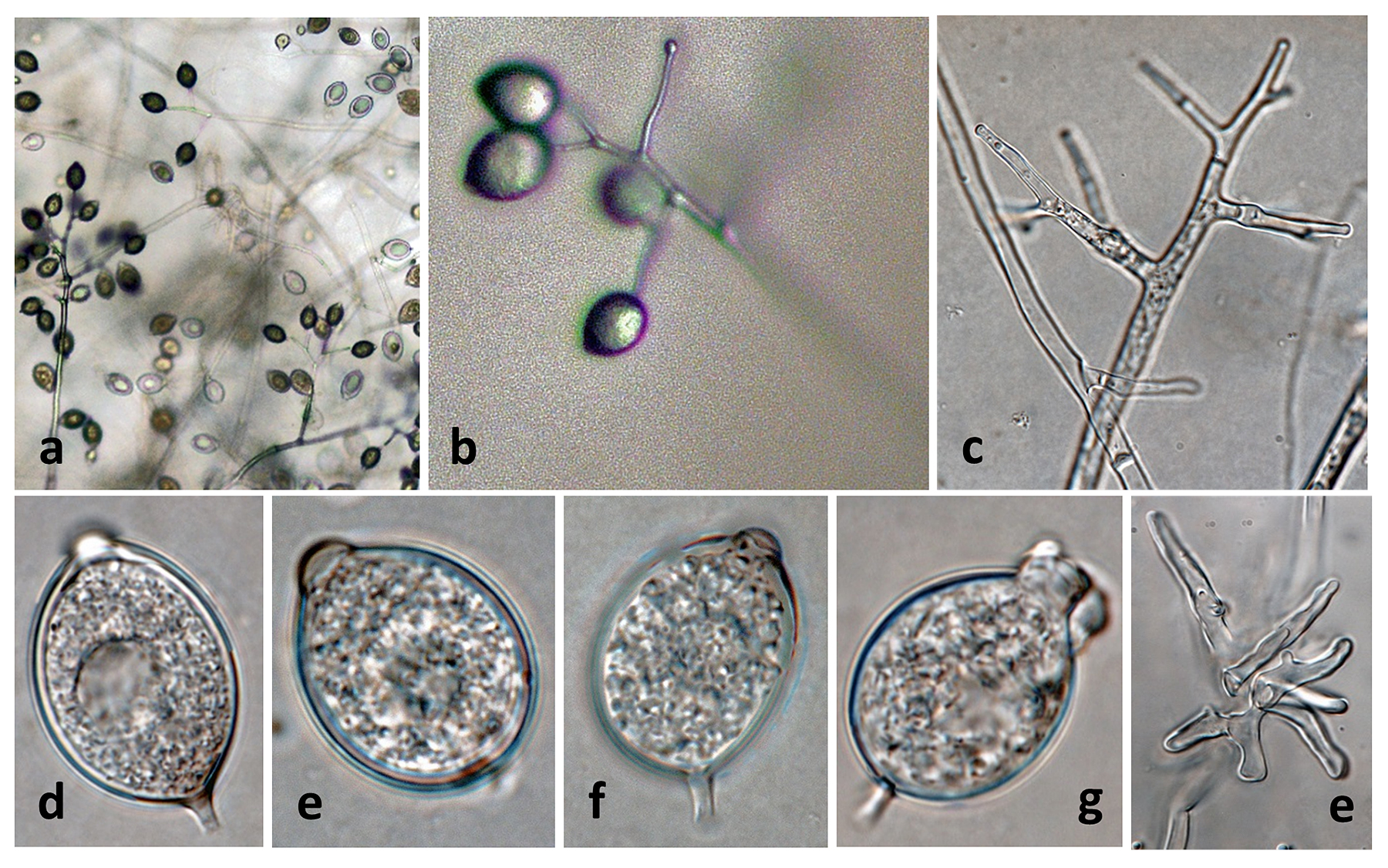 Phytophthora litchii nbsp;(CPHST BL 48G) asexual phase: (a-c) sporangiophores, (c) downy-mildew-like erected sporangiophores, (d-g) papillated sporangia, (e) finger-like hyphal swellings; photos by Gloria Abad, USDA-APHIS-PPQ.
Phytophthora litchii nbsp;(CPHST BL 48G) asexual phase: (a-c) sporangiophores, (c) downy-mildew-like erected sporangiophores, (d-g) papillated sporangia, (e) finger-like hyphal swellings; photos by Gloria Abad, USDA-APHIS-PPQ.
Phytophthora litchii (CPHST BL 48G) asexual phase: (a-c) sporangiophores, (c) downy-mildew-like erected sporangiophores, (d-g) papillated sporangia, (e) finger-like hyphal swellings; photos by Gloria Abad, USDA-APHIS-PPQ.

